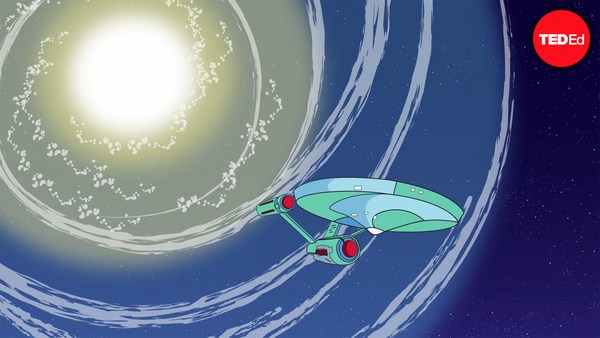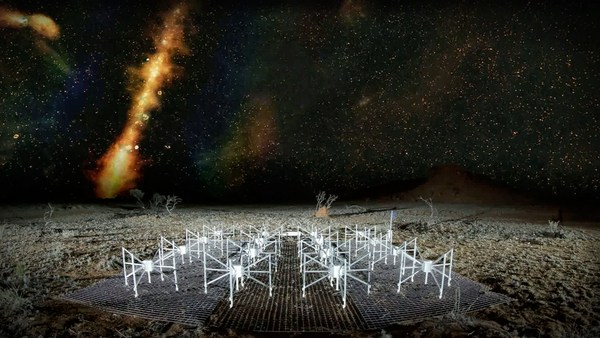Good evening, everyone. Tonight's question is apparently not related to beauty; but you'll see it will be. Why should we invest in space? It's a question that makes perfect sense, actually, absolutely legitimate, because the priorities of our planet are hugely, apparently, more important. What's the point of investing money, time, resources, forces, to send - for example - a probe into orbit around a planet or to get the first black hole image, or to study Martian rocks? Not only that! You should know that in 1977 NASA launched two twin probes, called "Voyager", to study the outer solar system. Aboard these two probes were two gold discs, completely covered with gold. Two objects apparently useless, without any scientific usefulness. But nevertheless, they spent money, they invested human resources to put these two objects on two ships wandering among the stars. What's the point of all this? I would like to give you two answers this evening: a practical response, that may satisfy many of the people who ask themselves the initial question. But it won't be the answer I want to give, because I don’t even want to give you an answer. What I want to do tonight it's a journey, made up of dreams, beauty, awareness, at the end of which, perhaps, you will find the answer within you. Let me begin talking about a failure. A failure that could have been one of the greatest failures of space exploration. In 1990, scientists sent into orbit around the Earth a space telescope, named Hubble, that should have changed completely our understanding of the cosmos. But, a couple of weeks after launch, this you see on the left is one of the images that began to arrive: completely blurred, totally unusable. And this is for a tiny defect in the telescope's main mirror. After 30 years, we know that Hubble Space Telescope was - and still is - a resounding success; because three years after the launch the astronauts went physically to correct this defect, and then it started sending images like the one on the right, finally live up to expectations. But guys, losing three years of data on this project would be a huge disaster! This is why astronomers began to develop techniques to improve dynamic range, resolution and detail of the blurry images Hubble was sending, finally producing results which were not perfect yet but usable by the scientific community. The wonder is that these techniques were lent to medicine, producing results like this. This is a mammographic image obtained with those techniques. The doctors were able to identify much smaller breast microcalcifications, previously unseen, facilitating quicker diagnoses and implementing better and much less invasive treatments. So, think: if a failure of space research causes this result, saving human lives, imagine how many technological spin-offs for human life here on earth, the endless successes of space exploration have produced in recent decades! Imagine, for example, water filters, that give back the most precious asset to people who might otherwise die of thirst; imagine technologies we use every day: the one you have on your smartphones, internet, GPS or weather forecasts, that let you know if tomorrow you must take the umbrella, after you get up, or not; imagine all the satellites that constantly monitor our planet, allowing us to understand that climate change is our main responsibility. But it's the same space search to give us technologies, like solar panels, that are giving us minimal help to counter the consequences of these climate changes. So space research results into progress, in technologies democratically available to all humanity. Which better practical answer we can give to people who ask themselves the original question? But, really, it's not for these reasons that we look up to heaven; it's not for these reasons that we explore the cosmos. Think about it: no one wonders about the meaning of art, philosophy, music, dance, all the arts. But, actually, don't give a technological return, nor they solve problems. But maybe no one asks the meaning of all these things because they are an expression of our feelings and emotions; It would not make sense to ask why people externalize what they feel inside! Doesn't make any sense. This is because expressing our emotions, our feelings is what makes us alive, is what literally makes us human beings. Among the things that art bequeathed to us is knowing where we came from, knowing who we were, since art was used as fundamental mean of communication. But not only that: art makes us understand who we have been using the language of the beauty of forms, of writing, of colors, and geometries. Art also tells our battles, art is revolution made with a paint brush, with a chisel, with a pen; and why not, even with our voice. All these things have marked on people's souls and hearts much more than all swords, rifles and guns we could ever made. And what is space exploration, but an understanding of the highest and most sublime form of art? An art that we did not create, but that nature itself given us and that we simply need to understand! Ever since we were hominids who lit the fire inside the caves, we were used to looking up at the sky, to use it as a guide to find our way, to figure out where to go, to mark the passage of time. Ever since we set foot on this planet, we understood that observe the sky was in our nature of incredible explorers. And it’s because of our attempts to understand the sky that we have made some of the most extraordinary revolutions: not only in science, but for humanity as a whole. When Galileo observed the phases of Venus, we discovered that we were not the center of the universe; when an astronomer named Hubble, at the beginning of the last century, observed a small variable star within the Andromeda galaxy, we saw that the universe was not limited to our galaxy, but it was much, much bigger. When we started building very powerful telescopes, was clear to us that our galaxy, our place in the cosmos, had nothing special: our galaxy was one out of millions of billions in the universe. And we understood our place in the cosmos, in our universe studying space here from Earth; but it's doing the reverse, going into space and studying our planet from there, that we understood our place in this world, and what our role was. From up there the Earth is small, suspended in the cold and inhospitable darkness of the cosmos; from up there, the Earth looks incredibly fragile, with its slender atmosphere that allows us to survive on its surface. However, despite its immense fragility, it's right up there that we realized that Earth is a beautiful place, with neither barriers nor boundaries, it's our home and it's the only home we've ever had and will ever have, and we all have to preserve it all together as one species. Images like this - I imagine you've recognized it, it's the first moon landing - well, they are very similar to the cave paintings that I showed you that we left in the caves thousands of years ago; despite the immense temporal, technological distance between them, both of these images make us understand who we were, where we came from and where we want to go. These are images of a disarming beauty and power. They tell our strength, they tell our tenacity, our perseverance, our ability, they tell that when we want we know how to cooperate towards a common goal. Images like this, in my opinion, are the most sublime form of art, one that's literally made, in this case, with the feet. Images like this are the symbol of our desire to exceed the limits that nature imposed on us. Space exploration, however, it's not only the human need to go beyond these limits; space exploration is also, or maybe mostly, man's desire to survive his own time. And this human desperate and wonderful feeling is embodied by those two probes I was talking at the beginning, the Voyager probes. But why put two gold records on these two probes? Science per se fails to explain it. Why put two scientifically useless objects on two ships roaming the Cosmos? What's the point of this? Why spend money, invest resources in something like that? The value of these two disks does not lie in their material: it lies in the message they contain. It's a message to a hypothetical alien civilization which one of the two probes may encounter. This message is our legacy, a fragment of our feelings, of our thoughts and emotions. If this hypothetical alien civilization was able to decipher the contents of these two gold discs it would see more than 100 images that would tell who we are, our society, and that would describe the beauties of our planet. But they also would hear the sounds of this planet: the thunder of a storm, the roar of falling rain, or the sound of a volcanic eruption. They would hear the sounds of the creatures of the earth: creatures that populate the depths of the forests, or walk in the savannah, and finally the sounds of humans. They'd hear our heartbeat, a laugh, a baby cry. Why a laugh and a baby cry? Because they are universal and genuine expressions, of our emotions, without any difference depending on skin colour or ethnicity. They would hear messages of peace and greetings in over 50 languages of the peoples of this planet. (Voices in different languages) And these are us Italians who entrusted our message to a hypothetical alien civilization. But in the two gold records, also called Golden Records, there is also music that peoples produced over time: aboriginal people, up to Beethoven's wonderful compositions. As you can see, inside the Golden records there's a lot more than they're showing. If really an alien civilization was able to decipher the contents of these disks it would discover a world united in peace, in brotherhood, in love and mutual respect. Now you're thinking: it's a lie that we never really believed either! But don't worry, because Voyagers will never even come close to a habitable planet, there will never be any civilization capable of collecting probes and decipher what is in the gold discs. So what's the point to have sent them out there in space with this symbolic cargo? Why did we do that? Because at a closer look, the golden records contain a message that is not really for the cosmos: it's a message referring to ourselves as human beings. We will be extinct, everything we have ever created will disappear with us: our art, our culture, our traditions, our technology, science, everything we have ever produced will disappear when mankind is extinct; and yet, the Voyager probes will continue to travel billions of years in space surviving our time, surviving ourselves and also the planet. A fragment of us, our heritage, our feelings, our emotions, our thoughts. What we were or, rather, what we actually wanted to be but we've never been able to put into practice, will continue to travel through the stars even when we are no longer there. We took the best of ourselves and we entrusted it to these two ships: that's our legacy. That's how we wanted to be and we have never been able to accomplish. Probes will keep traveling for billions of years, and we'll be gone. This is a small gift from a distant world and from the amazing creatures that populated it a sign of their hope and determination, a sign of their desperate need to survive their time in a vast and fantastic universe. Thanks. (Applause)





